#Jean Patrick Manchette
Text
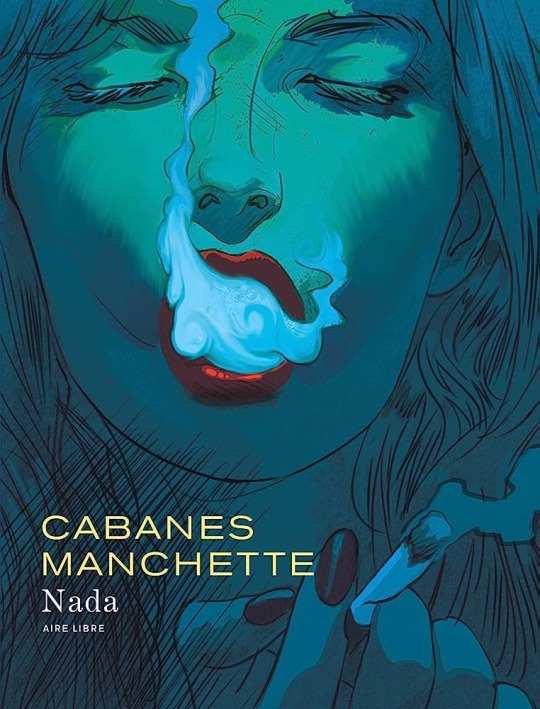
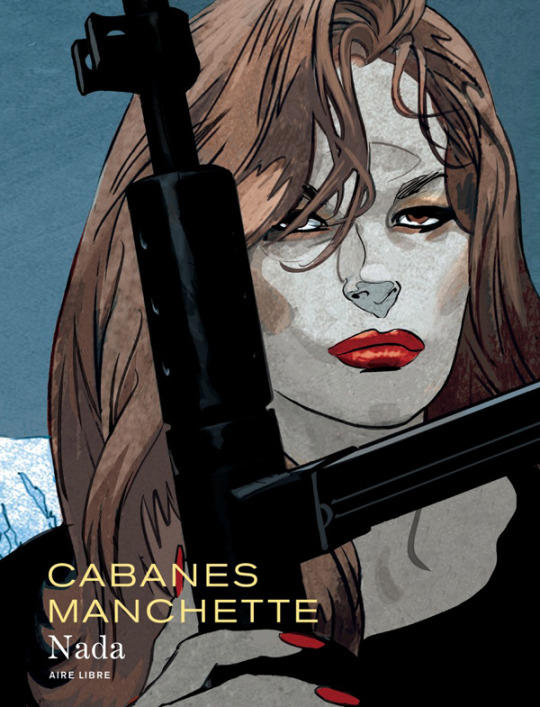
Nada, 2018, standard and limited editions. Adaptation of Jean-Patrick Manchette's 1972 novel by Max Cabanes (with Doug Headline, Manchette's son, as co-writer)
Third adaptation of Manchette by Cabanes.
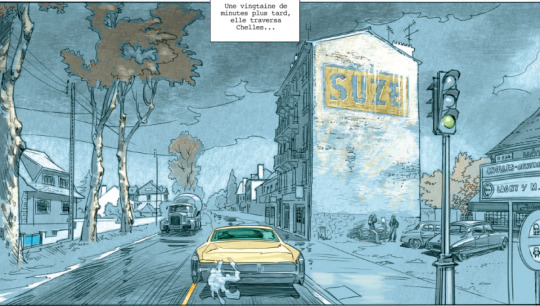
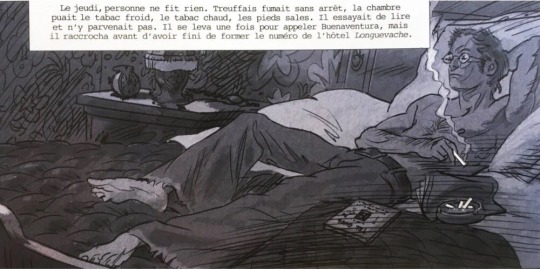
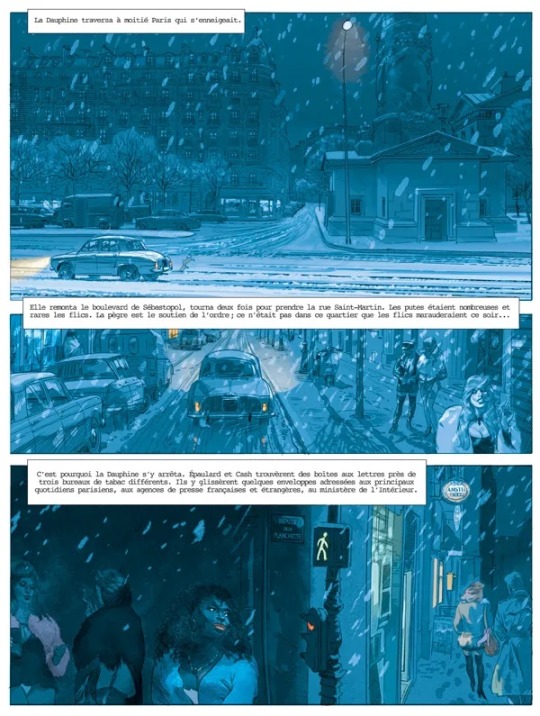
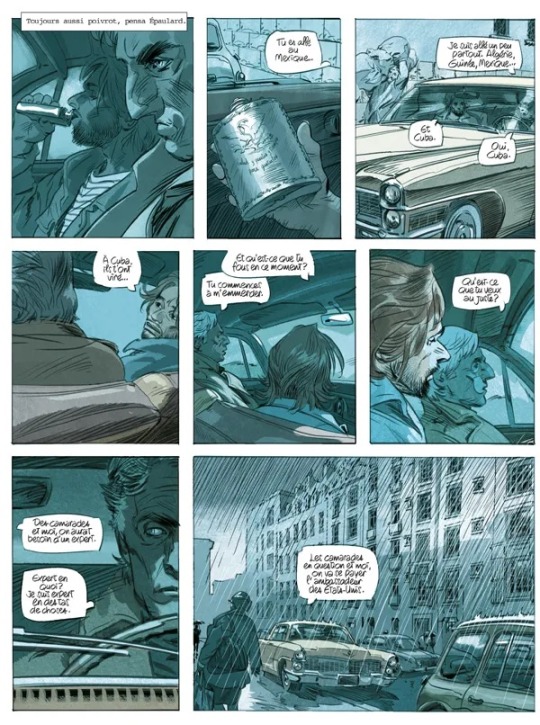
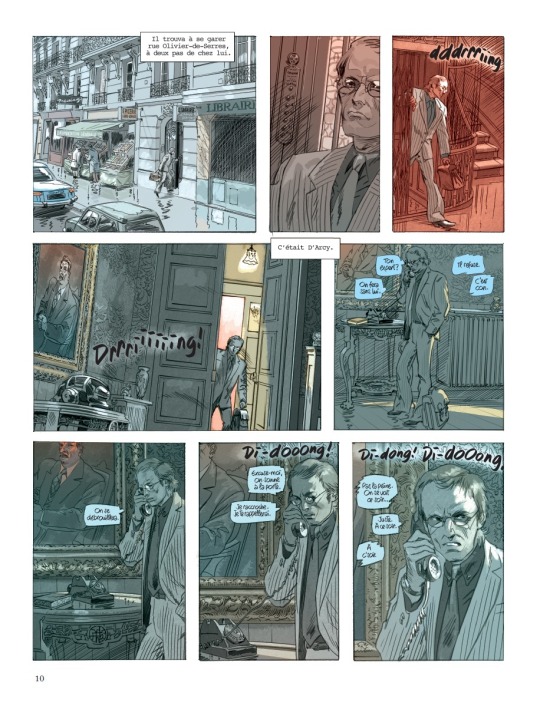
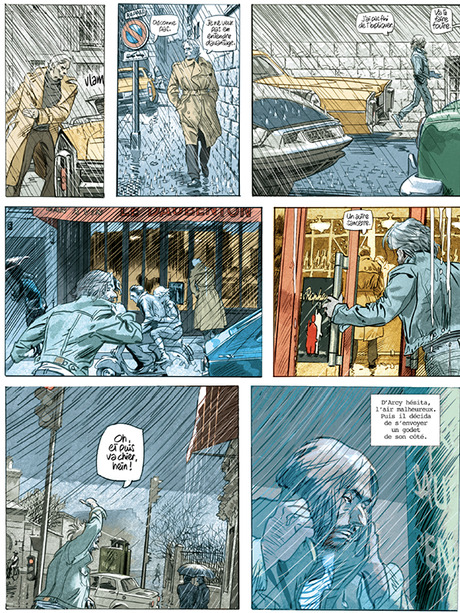

23 notes
·
View notes
Text
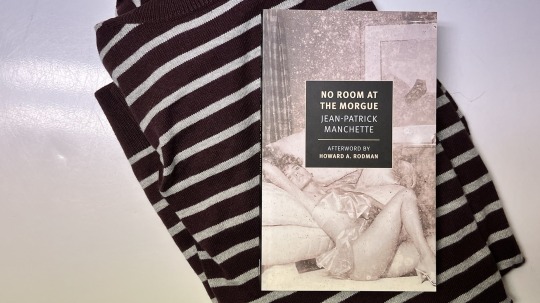
3 notes
·
View notes
Text
Skeletons in the Closet by Jean-Patrick Manchette, translated by Alyson Waters
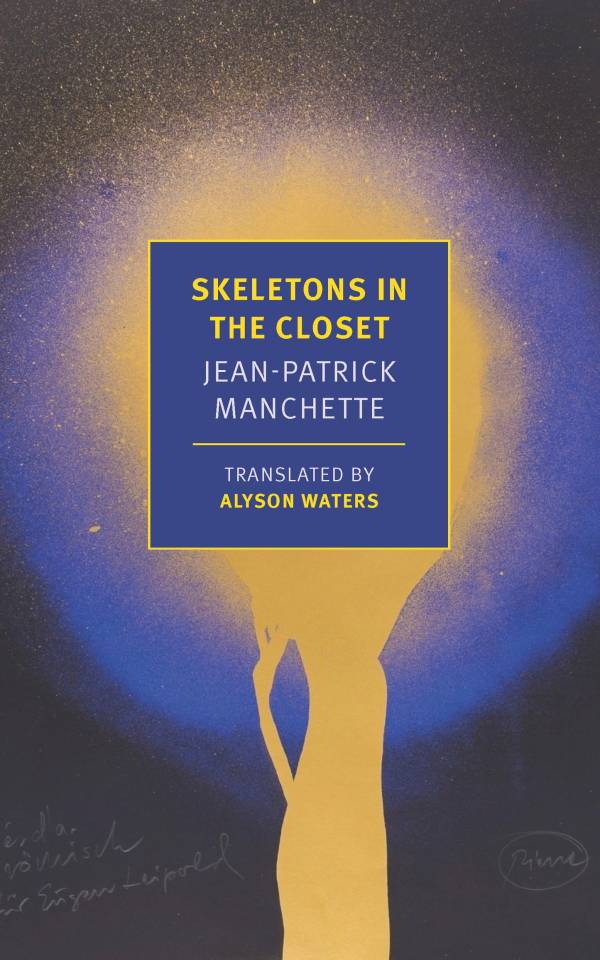
I left the apartment. Outside it was getting dark and had started to rain. It was cold. It was truly shitty weather. I raised my coat collar and strode toward the 2CV.
"In a hurry, Tarpon? Find what you were looking for?" Charles Pradier asked me as he appeared out of nowhere on my left and fell in step with me.
I glanced to my right, toward the road. Someone was walking one step behind me and he pushed me gently forward by my elbow.
"Don't be a fool. We just want to talk to you. Let's walk to your car."
I didn't answer. We walked to my car and got in, me at the steering wheel, Pradier next to me, and the other guy in the backseat.
"Don't turn around," he said, as I was about to do so to stare at him. He stopped my head from turning by grabbing a fistful of my hair. I grimaced because he was pulling on my scalp where it had been injured the day before. "Answer me," he ordered. "Did you find what you were looking for?"
We were there, in my car, in the cold, with harried people passing by on the sidewalk less than a foot away, and cars stalling on the road in the heavy traffic. We were totally isolated in what felt like a casket and Pradier patted me down quickly to make sure I wasn't armed. The windows were dripping with rain, adding halos around the neon signs of the stores and traffic lights.
"What were you looking for?" Anvil Man asked again, since I wasn't answering.
"Are you by any chance Philippine's fiancé?" I ventured.
"What were you looking for, Tarpon?"
His voice was patient and calm, his elocution precise, as if French weren't his mother tongue. He was a totally different animal from Pradier, and I think he was starting to scare me.
"Nothing in particular. A clue of some kind," I said slightly grotesquely. Pradier sniggered. "Listen," I said, "when Marthe Pigot came to see me, she was dressed like a little old lady from the country. When she was killed, she was wearing a fake-fur coat and other things. . . I just wanted to see how she usually dressed."
Anvil Man let out an approving groan. "And what did you conclude?"
"Nothing. She wanted me to think she was a harmless simpleton, I suppose, when she came to see me. And maybe she wasn't harmless for everyone." (I sighed and waved my hand cloquently.)
"And what the hell do you care about that, Tarpon?"
"'Scuse me?"
"She's dead. And she's no longer your client. You don't have a client anymore. Why don't you let the police deal with the matter?"
"The lady," I declared cinegenically, "paid me for two weeks of work in advance."
Behind me Anvil Man let out a disgusted snort. "Who asked you to work on the case, Tarpon?"
"Let's say it was Fanch Tanguy," I answered.
I don't know what got into me to say that. Maybe I wanted to see their reaction. I looked Pradier straight in the eye and he didn't react in the least, but behind me I heard Anvil Man suck in air through his teeth, and then I heard a characteristic click. No doubt about it, Anvil Man had retracted the breechblock of a semiautomatic weapon.
"We'll have to talk about that somewhere else, then. Start the car." (Pradier shot him a surprised glance.)
I started the car. Anvil Man told me what direction to take. We drove out of Mantes and headed toward Meulan on Route 190.
"Slow down," Anvil Man ordered as we were nearing a protected intersection. "Now turn left." (I turned onto a torn-up local road. Pradier looked surprised again.)
Night had fallen and in the darkness a car was coming in the opposite direction with its high beams on. I raised my right hand and adjusted the rearview mirror. At the second when the other car arrived next to us and whooshed by, the inside of the car was lit and in the rearview mirror I clearly saw Anvil Man's face. He was over forty and looked Scandinavian. He was wearing a Prince of Wales hat with a narrow border pulled down. He had a shadow of a salt-and-pepper mustache and blue eyes that were staring straight at me from behind rimless glasses.
We kept on driving, but now I knew he was going to kill me in a few minutes, probably as soon as he'd found the right spot. Then the deserted road began to descend a wooded hillside.
"Slow down," said Anvil Man.
I turned ever so slightly to the right and we ran smack into a mile marker.
The 2CV hadn't been going fast, but still. I had seen it coming and had braced myself with my feet, so I went upward, my head in the soft part of the roof and my heels on the floor, but I hit my hip bones very painfully against the steering wheel. Pradier's head and shoulders had gone completely through the windshield. The Scandinavian Anvil Man, whỏ'd been the best protected, was flung forward and his hand wound up wedged between the two front seatbacks, a hand that was armed with a Colt .45 automatic with an enormous silencer the size of a turnip.
Meanwhile, the engine block was being crushed, the hood was popping up toward the heavens, the windshield was exploding while Pradier was going through it, and all four doors burst open. The entire car was lifted about thirty centimeters off the ground then fell down on its shock absorbers with a clang.
I fell down at the same time, roaring in pain, and immediately grabbed onto Anvil Man's wrist. A shot went off with a pow! and a hole five or six centimeters in diameter appeared in the dashboard. I pushed down as hard as I could on the wrist, using the bar between the seats as leverage. The wrist snapped.
"Ha," said the Scandinavian. Nothing else, just "Ha!" and he bopped me on the ear with his left fist.
I tore the pistol from his broken hand, but I kept a tight hold on his wrist because I wanted us to stop hitting each other and talk like civilized folk, but he persisted in slugging me on the ear with his other fist, and then he drew his knees up under his chin and bucked. The entire front seat was torn off its base and I was half crushed between my seat and the steering wheel.
Ilet go of his broken wrist. The Scandinavian dived headfirst out of the open door. I aimed at him over the seat but I hesitated for a second because I knew that with this gun, it wasn't possible simply to injure someone. He rolled himself up in a ball and disappeared down the slope, into the fields and the night.
I got out of the car as quickly as possible. Pradier hadn't budged since the impact: he was lying with his stomach across the hood and his legs inside. As far as I could tell in the dark, his face was bathed in blood. I walked around the car. I was doubled over from the pain in my hips and I could only move forward sideways, like a crab.
In the dry grass, maybe two hundred meters away, I thought I could distinguish a light-colored blob making a getaway. I aimed the .45 with both hands, but it was difficult, and I was trembling like a leaf. And then the light-colored blob disappeared. (pp. 32-36)
1 note
·
View note
Photo
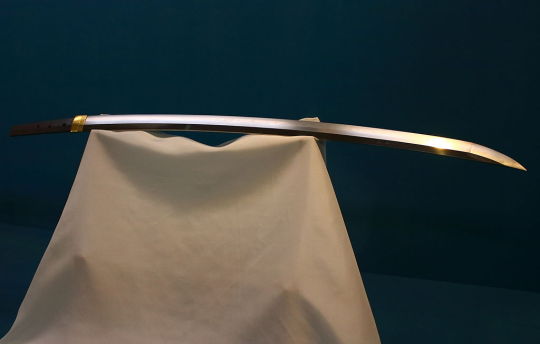
Isabella Hammad, Elisa Gonzalez, and Peter Mishler Recommend
On a film by Kurosawa, a crime novel by Jean-Patrick Manchette, and new recordings by Mat Ball and Kali Malone.
https://www.theparisreview.org/blog/2023/01/20/isabella-hammad-elisa-gonzalez-and-peter-mishler-recommend/
#The Review’s Review#experimental music#Featured#Japanese film#Jean-Patrick Manchette#sound art#The Paris Review
0 notes
Text

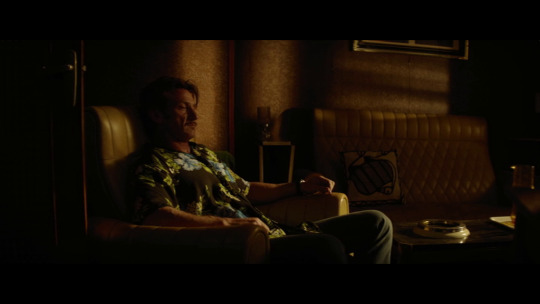
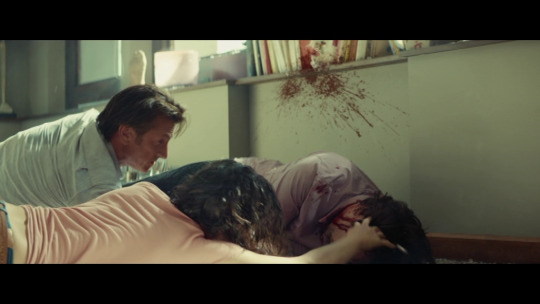
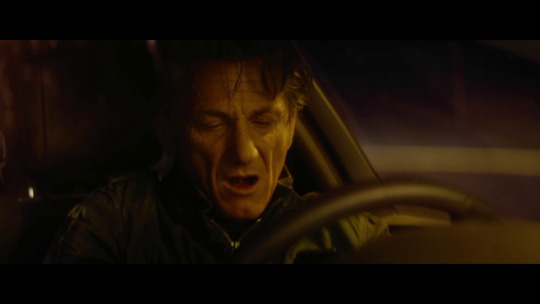
youtube
The Gunman (2015)
My rating: 6/10
I think the word people generally use for movies like this is "workmanlike": perfectly well made, but rather old-fashioned (this thing has an actual damsel in distress, who is implied to have been raped entirely for the male lead to have a reaction) and unremarkable. Cast's pretty good, though.
#The Gunman#Pierre Morel#Jean-Patrick Manchette#Don MacPherson#Pete Travis#Sean Penn#Idris Elba#Jasmine Trinca#rape mention#Youtube
1 note
·
View note
Text
2 juillet 22 | Sommeil de cendres
2 juillet 22 | Sommeil de cendres
520. Sommeil de cendres est le dernier roman de Xavier Boissel, paru le 15 juin 22 chez 10/18. Sélectionné pour le “Prix France Bleu L’histoire en polar” , il se déploie dans une France pompidolienne et giscardienne, en 1974 et 1975. Histoire que l’auteur fouaille dans son précédent roman policier Avant l’aube (2017, 10/18), mais aussi dans toute son œuvre : Paris est un leurre, la véritable…
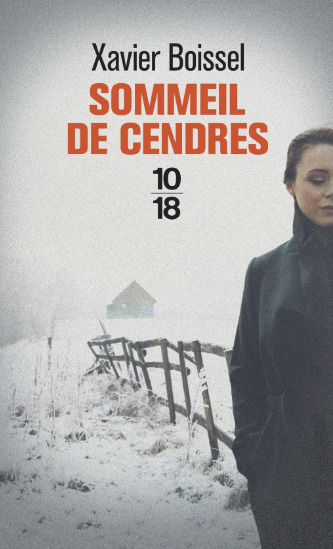
View On WordPress
#Autopsie des ombres#Avant l&039;aube#capsules de temps#Hegel#Jean-Patrick Manchette#littérature policière#Paris est un leurre#Rivières de la nuit#roman noir#Sommeil de cendres#Xavier Boissel
0 notes
Text
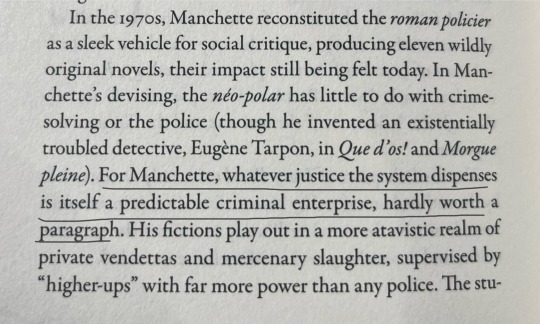
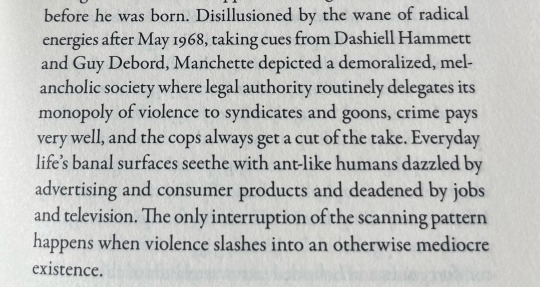
gary indiana afterword to “ivory pearl” by jean patrick manchette
3 notes
·
View notes
Text
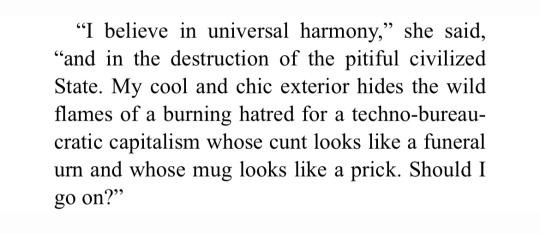
nada by jean-patrick manchette
4 notes
·
View notes
Text
BOOKS
The last 10 books I’ve read:
1. A Heart That Works - Rob Delaney
This is, by far the most heartbreaking book I’ve ever read. Rob Delaney is a comedian and a writer and he wrote this book after his three year old son died of a rare brain tumor. It’s incredibly sad but also tender and there’s even funny moments. It’s one of the most eloquent and graceful books I’ve ever read. I highly recommend buying a Costco sized box of Kleenex and giving this a read. It’s very powerful.
2. The Mad and the Bad - Jean-Patrick Manchette
This was a pretty fun read. It’s kind of random and unexpected. I don’t want to give too much away but it’s about a hitman with some gastro-intestinal maladies who’s hired for a kill and then all the twists and turns that unfold. Fun, quick read but not a book I’d seek out.
3. Altamont: The Rolling Stones, The Hells Angels, and the Inside Story of Rock’s Darkest Day - Joel Selvin
I really enjoyed this book. A lot of people my age, too young to have attended Woodstock, have nevertheless heard a lot about it. Whether or not it’s an accurate representation is another issue, but not a lot of us know about Altamont - kind of the opposite of Woodstock, or how it happened or why it happened. If you’ve seen the documentary Gimme Shelter then you probably already know a lot of this, but as someone who is a huge fan of this era of music I found this book riveting.
4. Burning in Water Drowning in Flame - Charles Bukowski
I happened to be back in Vancouver over the weekend and so I stopped by one of my favourite bookstores in search of more old books of Bukowski’s poetry and I found not one, but TWO! I bought them both and finished the first one the day after I got home. More classic dark, gritty, ugly, Bukowski.
5. The People Look Like Flowers At Last - Charles Bukowski
Well, immediately after finishing the last book I picked up the other one and read it in a day. This was published posthumously and it has a lot of honesty about death in it that isn’t always there in a lot of his other stuff. It was refreshing but still, it has that classic Bukowski feel. I don’t know what I’ll do when I’ve read all his stuff. Read it again, I guess.
6. Play the Piano Drunk Like a Percussion Instrument Until the Fingers Begin to Bleed a Bit - Charles Bukowski
In between e-mailing and waiting for responses I picked this one up and re-read it pretty quickly. It’s one of his shortest books of poetry and it’s easy to read. Plus, it has one of my favourite poems of his. A short seven letter poem named Art.
7. The Last Night of the Earth Poems - Charles Bukowski
I decided to start re-reading some of Bukowski’s stuff. Maybe this is a phase? I don’t really know. But, reading is meant to be both educational and entertaining. Right now, I’m just really enjoying Bukowski so, I’ll keep on leaning into it for as long as it lasts. I think this is my favourite collection of his poetry. A lot of people say that Love is a Dog From Hell is his best, but I don’t agree. It’s by far the most sexual of his works, as in, a lot of his poems are about sex or sexuality, but I don’t think it’s his best work. To each their own.
8. Charles Bukowski On Writing - Charles Bukowski
You know when you can’t stop listening to a certain artist for a while but then it goes away and you don’t really want to listen to them anymore? Then, after a while, you forget about them until you come across them again somehow. And, if the mood is right, you get hooked again and they’re all you’re going to listen to for a while. I think that’s what’s going on for me with Bukowski right now. The stack of other “books to read” is growing by the day, but I just keep going back to his stuff.
9. Trainspotting - Irvine Welsh
Finally, a break from Bukowski. I’m sure you’re all thrilled. I went over to a friends house the other day and was admiring his books and he insisted on lending me something I’d never read before. I’ve never read anything by Irvine Welsh, and I haven’t seen the movie Trainspotting, so he eagerly lent me both Trainspotting and its sequel. Having been to Scotland several times and having lived there for a year in my teens, this book felt oddly nostalgic. Granted, I wasn’t running in these same circles, but the language really rang true. It’s largely written almost phonetically in a Scottish accent. If you’re not familiar with the slang or the flow of their speech, I imagine it would be a tough book to read. There is a short glossary at the back, but it’s pretty limited. I really enjoyed this book. It’s well written and it’s pretty dark. But there’s humour there too, and like I said, for me, nostalgia. I’m looking forward to reading the sequel.
10. Storm for the Living and the Dead - Charles Bukowski
I finished reading Trainspotting and picked this back up. I was about 3/4′s of the way through when I put it down to switch books. This is a collection of poems that were unpublished before Bukowski died. It’s interesting to have read “On Writing” and to know how Bukowski felt towards his publisher, “holding poems back” from being published. And now, after his death, there continues to be book after book of posthumous publications. I’m sure he would’ve been pissed. But, when wasn’t he?
more soon,
-joshua
2 notes
·
View notes
Text
Reading 2023
5-January-2023: Tanizaki, Junichirō, The Maids (1963, Japan)
13-January-2023: Tevis, Walter, Mockingbird (1980, USA)
22-January-2023: Snyder, Michael, James Purdy: Life of a Contrarian Writer (2022, USA)
29-January-2023: Pressburger, Emeric, The Glass Pearls (1966, England)
31-January-2023: Mac Orlan, Pierre, A Handbook for the Perfect Adventurer (1951, France)
5-February-2023: Runciman, Steven, The First Crusade (Vol I: A History of the Crusades) (1951, England)
11-February-2023: Babitz, Eve, I Used to be Charming (1975-1997, USA)
15-February-2023: Indiana, Gary, Rent Boy (1994, USA)
26-February-2023: Zola, Émile, The Sin of Abbé Mouret (1875, France)
2-March-2023: Bennett, Alice, Alarm (Object Lessons), (2023, USA)
9-March-2023: Wyndham, John, The Kraken Wakes (1953. England)
17-March-2023: Manchette, Jean-Patrick, The Prone Gunman (1981, France)
17-March-2023: Shawn, Wallace, Night Thoughts: An Essay (2017, USA)
19-March-2023: Runciman, Steven, The Kingdom of Jerusalem (Vol II: A History of the Crusades) (1953, England)
26-March-2023: Carr, David, Final Draft: The Collected Work of David Carr (2020, USA)
5-April-2023: Manzoni, Alessandro, The Betrothed (1840, Italy)
10-April-2023: Childs, Craig, Finders Keepers: A Tale of Archaeological Plunder and Obsession (2010, USA)
16-April-2023: Butler. Octavia, Kindred (1979, USA)
22-April-2023: Liming, Sheila, Hanging Out: The Radical Power of Killing Time (2023, USA)
24-April-2023: Manchette, Jean-Patrick, Three to Kill (1976, France)
30-April-2023: Keefe, Patrick Radden, Empire of Pain: The Secret History of the Sackler Dynasty (2021, USA)
7-May-2023: Le Carré, John, Agent Running in the Field (2019, England)
10-May-2023: Dederer, Claire, Monsters: A Fan’s Dilemma (2023, USA)
13-May-2023: Mortimer, Penelope, Daddy’s Gone A-Hunting (1956, England)
26-May-2023: Morrison, Toni, Beloved (1987, USA)
30-May-2023: McCarthy, Cormac, The Passenger (2022, USA)
1-June-2023: Lewis, Herbert Clyde, Gentleman Overboard (1937, USA)
6-June-2023: Miéville, China, Embassytown (2011, England)
10-June-2023: McCarthy, Cormac, Stella Maris (2022, USA)
16-June-2023: Ambler, Eric, The Light of Day (1962, England)
23-June-2023: Ambler, Eric, Dirty Story (1967, England)
25-June-2023: Runciman, Steven, The Kingdom of Acre (Volume III, A History of the Crusades) (1954, England)
27-June-2023: Hartley, L.P., The Harness Room (1971, England)
4-July-2023: Motley, Willard, Knock on Any Door (1947, USA)
8-July-2023: Duras, Marguerite, The North China Lover (1991. France)
10-July-2023: Carr, J. L., A Month in the Country (1980, England)
14-July-2023: Thoreau, Henry David, Cape Cod (1865, USA)
18-July-2023: Modiano, Patrick, Missing Person (1978, France)
22-July-2023: Prime-Stevenson, Edward, Left to Themselves: The Ordeal of Philip and Gerald (1891, USA)
24-July-2023: Shakespeare, William, King Lear (1606, England)
6-August-2023: Whitehead, Colson, Crook Manifesto (2013, USA)
11-August-2023: Hampson, John, Last Night at the Greyhound (1931, England)
16-August-2023: Wyndham, John, The Midwich Cuckoos (1957, England)
19-August-2023: Ballard, J. G., The Drought (1965, England)
22-August-2023: Hines, Barry, A Kestrel for a Knave (1968, England)
31-August-2023: McPherson, William, Testing the Current (1984, USA)
10-September-2023: Pamuk, Orhan, Nights of Plague (2021, Turkey)
17-September-2023: Thoreau, Henry David, The Maine Woods (1864, USA)
20-September-2023: Thoreau, Henry David, A Plea for Captain John Brown (and other essays on abolition) (1859, USA)
24-September-2023: Kirino, Natsuo Real Life (2006, Japan)
30-September-2023: Renouard, Maël, Fragments of an Infinite Memory: My Life with the Internet (2016, France)
7-October-2023: Hamilton, Patrick, The Midnight Bell (1929, England)
12-October-2023: Hamilton, Patrick, The Siege of Pleasure (1932, England)
15-October-2023: Hamilton, Patrick, The Plains of Cement (1934, England)
21-October-2023: Kayama, Shigeru, Godzilla and Godzilla Raids Again (1955, Japan)
25-October-2023: Malcolm, Janet, Still Pictures: On Photography and Memory (2023, USA)
30-October-2023: Vonnegut, Kurt, Slaughterhouse-Five (1969, USA)
5-November-2023: Warner, Sylvia Townsend, Lolly Willowes (1926, England)
26-November-2023: Ainsworth, William Harrison, The Lancashire Witches (1848, England)
2-December-2023: Ginzburg, Carlo, Ecstasies: Deciphering the Witches’ Sabbath (1989, Italy)
10-December-2023: Baum, Vicki, Grand Hotel (1929, Germany)
16-December-2023: Sinykin, Dan, Big Fiction: How Conglomerates Changed the Publishing Industry and American Literature (2023, USA)
24-December-2023: Warner, Sylvia Townsend, T.H. White: A Biography (1967, England)
29-December-2023: Undset, Sigrid, Olav Audunssøn, Vol 4: Winter (1927, Norway)
1 note
·
View note
Text

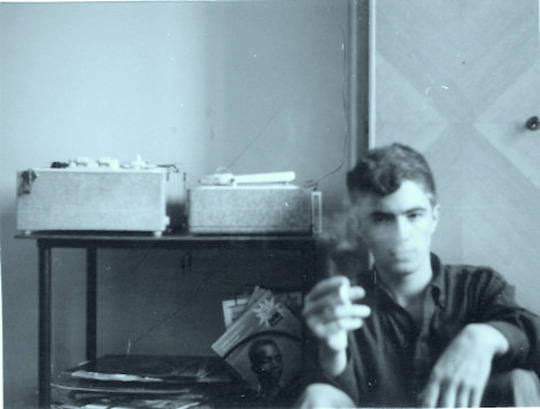
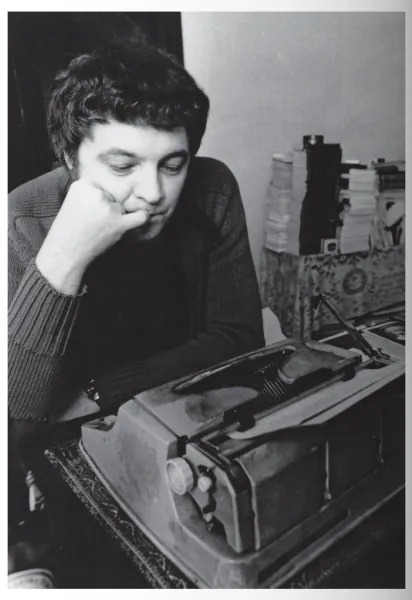
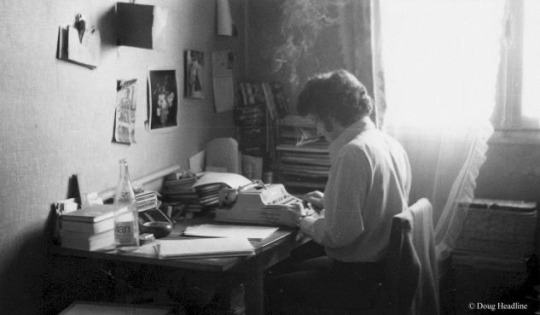
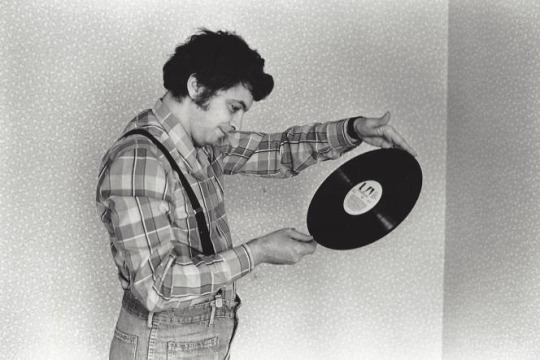
Remembering Jean-Patrick Manchette (19 December 1942 – 3 June 1995)
3 notes
·
View notes
Text
Jean-Patrick Manchette
Cette forme d’accumulations récurrentes révèle deux enjeux : d’abord une critique ironique des « effets de réel » chers à nos grands écrivains naturalistes, ces purs indices de réalité, ce « faire vrai » destiné à maintenir le lecteur dans l’illusion que ce qu’il lit, c’est la Nature. Le second enjeu est plus nettement politique : la mise en scène de la marchandise, et cette faculté qu’ont les objets de dire « nous sommes le réel » au détriment de l’homme, de la personne, de l’individu. « À la désintégration du sujet, à la crise de son identité (à la recherche d’une vérité, de la valeur) se substituent la réification du sujet individuel et la prépondérance de l’objet, du monde des choses. » Nous sommes dans les années soixante-dix, l’époque du standing, du design, « du pop, op et cinétique » et de la critique des objets (H. Lefèvre, J. Baudrillard, le Nouveau roman, G. Perec). « L’instrumentation d’un monde juge ce monde. […] L’instrumentation est une affaire de morale.
https://www.cairn.info/revue-mouvements-2001-3-page-88.htm
Le roman policier, littérature de « classe » mais aussi produit de consommation qui a pour but de distraire plutôt que de donner à réfléchir, est à la fois le médium et la cible idéaux pour le projet marxiste et situationniste de Manchette, puisque :
[…] le genre se conforme à l’esprit du capitalisme libéral en exprimant et véhiculant une certaine conception de la productivité. La formule du roman d’enquête introduit sur le marché un type de récit voué à une production-consommation aussi rapide qu’efficace. (Dubois 1992 : 26)
« l’histoire du roman policier est une histoire sociale, car elle apparaît comme inextricablement liée à l’histoire de la société bourgeoise – voire de la production marchande – et surdéterminée par elle » (Mandel 1986). Manchette va donc s’attacher à démontrer que le crime n’est pas un fait isolé et relevant d’un dysfonctionnement de l’individu mais une conséquence inévitable de l’organisation sociale, économique et politique, et à attaquer la société capitaliste en se servant de ses propres réseaux de production et de distribution. Ainsi, pour lui, « [l]e bon roman noir est un roman social, un roman de critique sociale, qui prend pour anecdote des histoires de crimes, mais qui essaie de donner un portrait de la société » (Manchette [1993] 1996 : 6).
0 notes
Text
La Position du tireur couché, Jean-Patrick Manchette (Gallimard / Folio Policier) - Seb
J’aime beaucoup cet auteur
View On WordPress
0 notes
Photo
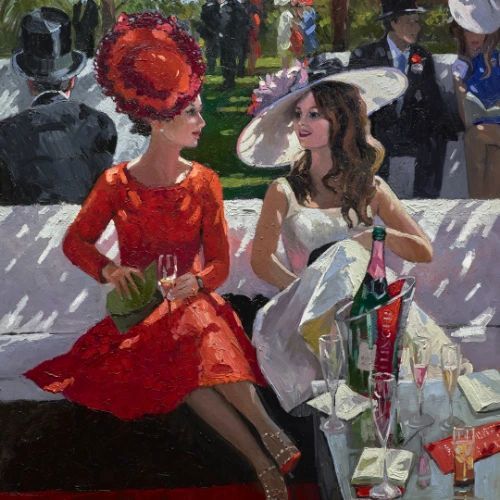
LA MARIÉE ÉTAIT EN ROUGE Sherree Valentine Daines, artiste peintre anglaise, est née à Effingham, Surrey. Elle n'a pas toujours été artiste, à 18 ans elle commence à travailler comme secrétaire juridique à Londres. La Mariée rouge a été adapté du roman de Hervé Jaouen. VOCES8, Sibéal - Traditional: Carrickfergus (Arr. Pacey)" https://youtu.be/-Cz8nQAi2A4 Un couple de jeunes, dans une cavale nihiliste et suicidaire, croise le chemin d'un trio de ferrailleurs, d'un commando d'autodéfense et d'une noce, dans le fin fond de la campagne bretonne ; une épopée tragique et ultraviolente qui se termine dans le sang, servie par la prose grinçante d'Hervé Jaouen. Ce roman fit grand bruit lors de sa parution en 1979, en pleine vogue du néo-polar français lancé par A.D.G., Jean-Patrick Manchette et Jean Vautrin, entre autres, et qui se caractérisait par le soin apporté à l'écriture. #culturejaiflash https://www.instagram.com/p/CeqRSBDqiDF/?igshid=NGJjMDIxMWI=
0 notes
Video
youtube
#les maîtres du temps#rené laloux#moebius#Jean Patrick Manchette#1982#animation#Stefan Wul#l'orphelin de perdide#video
2 notes
·
View notes
